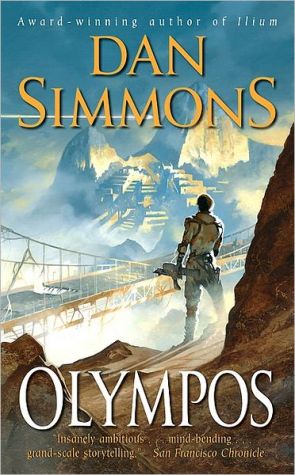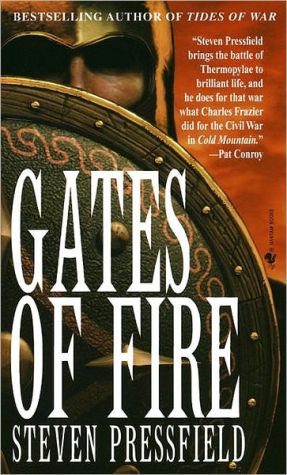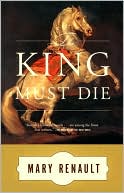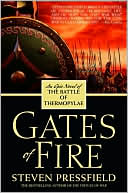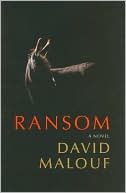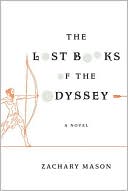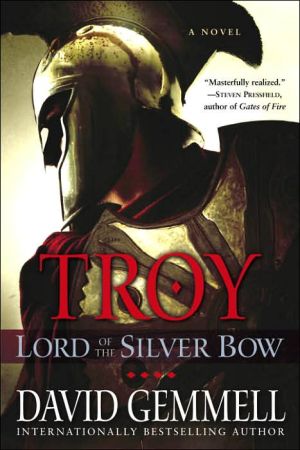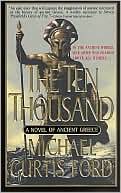Olympos
Beneath the gaze of the gods, the mighty armies of Greece and Troy met in fierce and glorious combat, scrupulously following the text set forth in Homer's timeless narrative. But that was before twenty-first-century scholar Thomas Hockenberry stirred the bloody brew, causing an enraged Achilles to join forces with his archenemy Hector and turn his murderous wrath on Zeus and the entire pantheon of divine manipulators; before the swift and terrible mechanical creatures that catered for...
Search in google:
Beneath the gaze of the gods, the mighty armies of Greece and Troy met in fierce and glorious combat, scrupulously following the text set forth in Homer's timeless narrative. But that was before twenty-first-century scholar Thomas Hockenberry stirred the bloody brew, causing an enraged Achilles to join forces with his archenemy Hector and turn his murderous wrath on Zeus and the entire pantheon of divine manipulators; before the swift and terrible mechanical creatures that catered for centuries to the pitiful idle remnants of Earth's human race began massing in the millions, to exterminate rather than serve.And now all bets are off.Publishers WeeklyDrawing from Homer's Iliad, Shakespeare's Tempest and the work of several 19th-century poets, Simmons achieves another triumph in this majestic, if convoluted, sequel to his much-praised Ilium (2003). Posthumans masquerading as the Greek gods and living on Mars travel back and forth through time and alternate universes to interfere in the real Trojan War, employing a resurrected late 20th-century classics professor, Thomas Hockenberry, as their tool. Meanwhile, the last remaining old-style human beings on a far-future Earth must struggle for survival against a variety of hostile forces. Superhuman entities with names like Prospero, Caliban and Ariel lay complex plots, using human beings as game pieces. From the outer solar system, an advanced race of semiorganic Artificial Intelligences, called moravecs, observe Earth and Mars in consternation, trying to make sense of the situation, hoping to shift the balance of power before out-of-control quantum forces destroy everything. This is powerful stuff, rich in both high-tech sense of wonder and literary allusions, but Simmons is in complete control of his material as half a dozen baroque plot lines smoothly converge on a rousing and highly satisfying conclusion. Agent, Richard Curtis. 7-city author tour. (June 28) Copyright 2005 Reed Business Information.
Olympos\ \ By Dan Simmons \ Eos\ ISBN: 0-380-97894-6 \ \ \ \ Chapter One\ Helen of Troy awakes just before dawn to the sound of air raid sirens. She feels along the cushions of her bed but her current lover, Hockenberry, is gone - slipped out into the night again before the servants wake, acting as he always does after their nights of lovemaking, acting as if he has done something shameful, no doubt stealing his way home this very minute through the alleys and back streets where the torches burn least bright. Helen thinks that Hockenberry is a strange and sad man. Then she remembers. \ My husband is dead.\ This fact, Paris killed in single combat with the merciless Apollo, has been reality for nine days - the great funeral involving both Trojans and Achaeans will begin in three hours if the god-chariot now over the city does not destroy Ilium completely in the next few minutes - but Helen still cannot believe that her Paris is gone. Paris, son of Priam, defeated on the field of battle? Paris dead? Paris thrown down into the shaded caverns of Hades without beauty of body or the elegance of action? Unthinkable.\ This is Paris, her beautiful boy-child who had stolen her away from Menelaus, past the guards and across the green lawns of Lacedaemon. This is Paris, her most attentive lover even after this long decade of tiring war, he whom she had often secretly referred to as her "plunging stallion full-fed at the manger."\ Helen slips out of bed and crosses to the outer balcony, parting the gauzy curtains as she emerges into the pre-dawn light of Ilium. It is midwinter and the marble is cold under her bare feet. The sky is still dark enough that she can see forty or fifty searchlights stabbing skyward, searching for the god or goddess and the flying chariot. Muffled plasma explosions ripple across the half dome of the moravecs' energy field that shields the city. Suddenly, multiple beams of coherent light - shafts of solid blue, emerald green, blood red - lance upward from Ilium's perimeter defenses. As Helen watches, a single huge explosion shakes the northern quadrant of the city, sending its shockwave echoing across the topless towers of Ilium and stirring the curls of Helen's long, dark hair from her shoulders. The gods have begun using physical bombs to penetrate the force shield in recent weeks, the single-molecule bomb casings quantum phase-shifting through the moravecs' shield. Or so Hockenberry and the amusing little metal creature, Mahnmut, have tried to explain to her.\ Helen of Troy does not give a fig about machines.\ Paris is dead. The thought is simply unsupportable. Helen has been prepared to die with Paris on the day that the Achaeans, led by her former husband, Menelaus, and by his brother Agamemnon, ultimately breach the walls, as breach they must according to her prophetess friend Cassandra, putting every man and boy-child in the city to death, raping the women and hauling them off to slavery in the Greek Isles. Helen has been ready for that day - ready to die by her own hand or by the sword of Menelaus - but somehow she has never really believed that her dear, vain, godlike Paris, her plunging stallion, her beautiful warriorhusband, could die first. Through more than nine years of siege and glorious battle, Helen has trusted the gods to keep her beloved Paris alive and intact and in her bed. And they did. And now they have killed him.\ She calls back the last time she saw her Trojan husband, ten days earlier, heading out from the city to enter into single combat with the god Apollo. Paris had never looked more confident in his armor of elegant, gleaming bronze, his head flung back, his long hair flowing back over his shoulders like a stallion's mane, his white teeth flashing as Helen and thousands of others watched and cheered from the wall above the Scaean Gate. His fast feet had sped him on, "sure and sleek in his glory," as King Priam's favorite bard liked to sing. But this day they had sped him on to his own slaughter by the hands of furious Apollo.\ And now he's dead, thinks Helen, and, if the whispered reports I've overheard are accurate, his body is a scorched and blasted thing, his bones broken, his perfect, golden face burned into an obscenely grinning skull, his blue eyes melted to tallow, tatters of barbecued flesh stringing back from his scorched cheekbones like ... like ... firstlings - like those charred first bits of ceremonial meat tossed from the sacrificial fire because they have been deemed unworthy. Helen shivers in the cold wind coming up with the dawn and watches smoke rise above the rooftops of Troy.\ Three antiaircraft rockets from the Achaean encampment to the south roar skyward in search of the retreating god-chariot. Helen catches a glimpse of that retreating chariot - a brief gleaming as bright as the morning star, pursued now by the exhaust trails from the Greek rockets. Without warning, the shining speck quantum shifts out of sight, leaving the morning sky empty. Flee back to besieged Olympos, you cowards, thinks Helen of Troy.\ The all-clear sirens begin to whine. The street below Helen's apartments in Paris's estate so near Priam's battered palace are suddenly filled with running men, bucket brigades rushing to the northwest where smoke still rises into the winter air. Moravec flying machines hum over the rooftops, looking like nothing so much as chitinous black hornets with their barbed landing gear and swiveling projectors. Some, she knows from experience and from Hockenberry's late-night rants, will fly what he calls air cover, too late to help, while others will aid in putting out the fire. Then Trojans and moravecs both will pull mangled bodies from the rubble for hours. Since Helen knows almost everyone in the city, she wonders numbly who will be in the ranks of those sent down to sunless Hades so early this morning ...\ (Continues...)\ \ \ \ \ Excerpted from Olympos by Dan Simmons Excerpted by permission.\ All rights reserved. No part of this excerpt may be reproduced or reprinted without permission in writing from the publisher.\ Excerpts are provided by Dial-A-Book Inc. solely for the personal use of visitors to this web site. \ \
\ From Barnes & NobleThe Barnes & Noble Review\ Olympos, the shelf-bending sequel to the Hugo Award–nominated Ilium and the concluding volume of Dan Simmons' epic Homeric duology, mixes hard science fiction with classic literature in a cataclysmic re-creation of the Trojan War that includes posthumans, biomechanical robots, the heroes of ancient Troy, the pantheon of Olympian gods, and even little green Martians! At the conclusion of Ilium, the Greek and Trojan armies -- battling it out on a terraformed Mars -- joined forces to take on Zeus and all the other gods in a battle to end all battles. But gods will be gods, and after Hera seduces and temporarily sidelines Zeus, the Trojan War resumes with even more brutality, as deities manipulate pivotal human participants such as Achilles, Hector, Agamemnon, and Helen. Meanwhile on Earth, an army of robotic voynix -- former human servants -- have begun systematically killing off all of their ex-masters. In yet another plot thread, Odysseus sets out on another quest to find his home -- and just maybe save the human race... One of the most ambitious science fiction works ever attempted, Simmons' Ilium and Olympos are massive in every sense of the word. Set on an immense stage of alternate Earth and Martian realities, peopled with literally hundreds of integral human and nonhuman characters, and powered by truly colossal themes, the books' numerous plotlines slowly interweave and eventually converge in an explosive conclusion that will leave readers shocked, stunned -- and utterly satisfied. Paul Goat Allen\ \ \ \ \ San Francisco Chronicle"Insanely ambitious . . . Ilium and OLYMPOS together solidify [Simmons’s] reputation as one of science fiction’s genuine modern masters."\ \ \ Sunday Denver Post"[OLYMPOS] manages to mix great literary pastiche with some highly original storytelling...thoughtful, inventive, clever and action-packed."\ \ \ \ \ Newark Star Ledger"A thoughtful but fast-paced tale that will leave heads spinning and hearts racing."\ \ \ \ \ St. Louis Post-Dispatch"Philosophy, physics and literature 101, wrapped up in the trappings of Buck Rogers-style space opera: great fun."\ \ \ \ \ Publishers WeeklyDrawing from Homer's Iliad, Shakespeare's Tempest and the work of several 19th-century poets, Simmons achieves another triumph in this majestic, if convoluted, sequel to his much-praised Ilium (2003). Posthumans masquerading as the Greek gods and living on Mars travel back and forth through time and alternate universes to interfere in the real Trojan War, employing a resurrected late 20th-century classics professor, Thomas Hockenberry, as their tool. Meanwhile, the last remaining old-style human beings on a far-future Earth must struggle for survival against a variety of hostile forces. Superhuman entities with names like Prospero, Caliban and Ariel lay complex plots, using human beings as game pieces. From the outer solar system, an advanced race of semiorganic Artificial Intelligences, called moravecs, observe Earth and Mars in consternation, trying to make sense of the situation, hoping to shift the balance of power before out-of-control quantum forces destroy everything. This is powerful stuff, rich in both high-tech sense of wonder and literary allusions, but Simmons is in complete control of his material as half a dozen baroque plot lines smoothly converge on a rousing and highly satisfying conclusion. Agent, Richard Curtis. 7-city author tour. (June 28) Copyright 2005 Reed Business Information.\ \ \ \ \ Library JournalA temporary alliance between Achilles and Hector brings Greeks and Trojans together to lay siege to the mountain home of the gods. Soon other powerful beings become involved in a cataclysmic battle between humans and powerful entities, with names such as Demogorgon and Night. Like its companion book Ilium, Simmons's latest mammoth novel takes place in the far-future where ancient Troy (Ilium) is re-created, along with its gods and heroes, on a terraformed Mars for the entertainment and edification of humanity's successors. Through the eyes of a resurrected and reconstituted 21st-century scholar named Hockenberry, the author of Hyperion Cantos explores the relationship of history and culture to the idea of humanity. An exceptional creation, this volume belongs in all libraries. Copyright 2005 Reed Business Information.\ \ \ \ \ School Library JournalAdult/High School-In Ilium (Eos, 2003), readers were introduced to Hockenberry, a 20th-century historian on a Mars of the far future restructured to look and feel like ancient Greece. He works for quantum-technology-wielding beings that brought classical mythology to life for their own amusement. Olympos places Hockenberry in an alliance with the Moravecs, a race of sentient robots who fear that the self-styled gods' technology will destroy the solar system. Together, they fight for ways to stop the Olympians. A second story line occurs on Earth, with humankind facing extinction from multiple directions. Voynix, powerful robotic creatures that once served humans, seem bent on killing and destroying everything they can. A monster named Caliban and a giant, pulsating brain known as Setebos add spine-tingling, H. P. Lovecraft-inspired terrors. Full of plot twists, doses of humor, and technologically pumped action sequences, this complex tale is nevertheless readable and surprisingly easy to follow. While it is even more complex than its predecessor, Simmons does a much better job of connecting the threads here. The mixing of Homer's Iliad and Shakespeare's The Tempest is likewise handled better, making more solid use of the personae. While it helps to have some familiarity with these classics, it isn't required. The spectacular ending leaves just enough open for a sequel. Fans of epic, action-driven science fiction will talk about this inventive and highly addictive thriller for years.-Matthew L. Moffett, Northern Virginia Community College, Annandale Copyright 2005 Reed Business Information.\ \ \ \ \ Kirkus ReviewsA sequel to Simmons's Ilium (2003) offers up the Trojan War along with elements from The Tempest, The Time Machine, Victorian poets and pop SF. Ilium ended with the Greek and Trojan heroes allied against the Olympian gods, advanced space-going robots called moravecs aiding the human side. Meanwhile, in a different reality, a lovely but decadent human civilization is under attack from its feral former servants, the robotlike voynix. A third plot strand now updates the conflict between the sorcerer Prospero, Caliban and Caliban's monstrous god Setebos. And the revived 20th-century American scholar Hockenberry attempts to chronicle the events while making love to volatile Helen of Troy. Simmons brings each subplot to a boil and spins off sub-subplots about Achilles' love for a dead Amazon queen, Odysseus' voyage to the alternate Earth with the moravecs, the arrival of Setebos and his minions in what was once Paris, etc. Everything comes together into a solid adventure story, with all the mysteries explained in respectably up-to-date SF terms. At the same time, Simmons adopts the device of having his characters quote freely from Homer, Shakespeare, Shelley, Browning, Proust and a host of other sources that liberal arts majors can have fun spotting. The author often gives his borrowings an ironic twist-as when Odysseus quotes Tennyson's "Ulysses" to a classical scholar who half-recognizes the poem, or when Prospero objects to playing himself in a production of The Tempest, not wanting to memorize so many lines. Homeric tags alternate with tough-guy street talk, and several of the moravec scientists turn out to be Star Trek fans. Simmons's gift for vivid description is evident throughout, aswell. He effectively combines a serious subject, ironic perspective, strong action and believable (if not always sympathetic) characters. Ambitious, witty, moving: Simmons at his best. Author tour\ \
